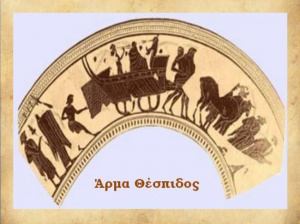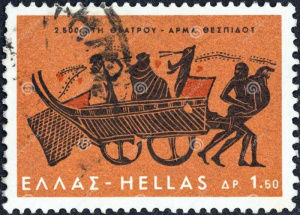Language/Ancient-greek-to-1453/Culture/Thespis-the-father-of-dramatic-art
Thespis and the birth of tragedy[edit | edit source]
Thespis (Θέσπις) was an ancient Greek poet, "the inventor of tragedy" and was the first laureate of the Great Dionysia in 534 BC. He was born in the ancient city of Icairus (today Dionysus). He was a significant innovator for the theater, as he introduced the independent actor, as opposed to the choir, as well as masks, makeup and costumes. According to ancient tradition, Thespis was the first actor in the Greek drama. According to Themistius (4th century AD), Aristotle, had said that, Thespis, was the first person to appear on stage as an actor playing a character in a play.
According to other sources, he introduced the first main actor in addition to the chorus. He is often called "the inventor of tragedy".
Thespis was a singer of dithyrambs (songs about stories from mythology with chorical refrains). He was credited with introducing a new style in which a singer or actor performed the words of individual characters in stories, distinguishing the characters with the help of different masks.
This new style was called tragedy, and Thespis was its most popular representative. Finally, in 534 BC. Capitalizing on his success, Thespis also invented the theatrical tour, he traveled through various cities carrying his costumes, masks and other props in a horse-drawn cart.
Thespis was the father of tragedy and more precisely:
- Discover the tragic genre and create the tragic song.
- He was the first to invent satyrs.
- He choreographs his works himself.
- He institutionalized the first hypocrite.
- He painted his face with natural dyes and then made a fabric mask, that is, fabric masks.
- Add to the rave songs the prologue and the sayings, that is to say the first spoken parts.
He started his theatrical career before '600 BC' .
Θέσπις: Ο πατέρας της δραματικής τέχνης[edit | edit source]
Ο Θέσπις, (6ος αιώνας π.Χ., Αθήνα), Έλληνας ποιητής, γεννήθηκε στο δήμο της Ικαρίας. Σύμφωνα με την αρχαία παράδοση, ο Θέσπις ήταν ο πρώτος ηθοποιός στο ελληνικό δράμα. Συχνά ονομαζόταν εφευρέτης της τραγωδίας και καταγράφηκε ως ο πρώτος που έκανε μια τραγωδία στα Μεγάλα (ή Πόλη) Διονύσια (περίπου το 534 π.Χ.).
Σύμφωνα με τον Έλληνα ρητορικό Θεμιστή (4ος αιώνας μ.Χ.), ο Αριστοτέλης είπε ότι η τραγωδία ήταν εντελώς χορωδία, έως ότου ο Θέσπις εισήγαγε τον πρόλογο και τις εσωτερικές ομιλίες. Ο Θέσπις ήταν ο πρώτος που συνδύασε το χορωδιακό τραγούδι με τις ομιλίες ενός ηθοποιού, και ξεκίνησε ο τραγικός διάλογος όταν ο ηθοποιός αντάλλαξε λόγια με τον αρχηγό του χορού.
Κατά τον 6ο και 7ο αιώνα στον ελλαδικό χώρο από τα τελεστήρια αναδύεται η μορφή των θεάτρων, ενώ ο Θέσπις εξελίσσει τα θεατρικά και σκηνικά μέσα. Είναι πολύ ενδιαφέρον ότι ένας από τους πιο σημαντικούς ευρετές του θεάτρου είναι ένας άνθρωπος γνωστός για τις περιοδείες. Έτσι λοιπόν, λέγεται ότι ο Θέσπις, που πρώτος συνέδεσε τ’όνομά του με την τέχνη του θεάτρου, ταξίδευε μαζί με τον χορό του ξεκινώντας από την Ικαρία (περιοχή της Αττικής), κουβαλώντας τις αποσκευές του σ’ ένα κάρο.
Σύμφωνα με πληροφορίες που συλλέγουμε απ’ τον Διοσκορίδη, τον Πλούταρχο, τον Κλήμη, τον Ευάνθιο κι ακόμ’ απ’ τον Αθήναιο, τον Διογένη τον Λαέρτιο και τη Σούδα, πρέπει να θεωρήσουμε ότι ο Θέσπις υπήρξε ο πατέρας της τραγωδίας και πιο συγκεκριμένα :
- Ανακάλυψε το τραγικό είδος και δημιούργησε το τραγικό άσμα.
- Επινόησε πρώτος τους σατύρους.
- Χορογράφησε ο ίδιος τα έργα του.
- Καθιέρωσε τον Πρώτο Υποκριτή.
- Έβαψε το πρόσωπό του με φυσικές χρωστικές ουσίες και μετά έφτιαξε Προσωπεία από πανί, δηλαδή υφασμάτινες μάσκες.
- Πρόσθεσε στα διθυραμβικά τραγούδια τον πρόλογο και τις ρήσεις, δηλαδή τα πρώτα ομιλητικά μέρη.
Τη θεατρική του σταδιοδρομία την άρχισε πριν απ’ το 600 π.Χ.
Source[edit | edit source]
- Britannica and Wikipedia
Author[edit source]
- Ευγενική χορηγία που στοχεύει να βοηθήσει μαθητές ή μη, απανταχού της Γης, που επιδίδονται στην εκμάθηση της ελληνικής γλώσσας!
- Contribution bénévole visant à aider les personnes, partout dans le monde, qui sont engagées dans l'apprentissage de la langue grecque !
- Voluntary contribution aimed at helping people, all over the world, who are committed to learning the Greek language!
Other Lessons[edit | edit source]
- Gamos – Marriage
- Greek Temples Residences for the Ancient Greek Gods
- Greek Philosopher quotes
- Amphidromia Ceremony birth of a child
- Timeline of ancient Greece
- Pindar Poem
- Ancient Greek first names for tattoos
- Ancient Greek Houses
- Linear B
- Miasma : Religious Pollution in Greek antiquity
- The Ancient Greek Afterlife
- Historical personalities
- The Ancient Greek Calendar
- Ancient Greece Timeline


